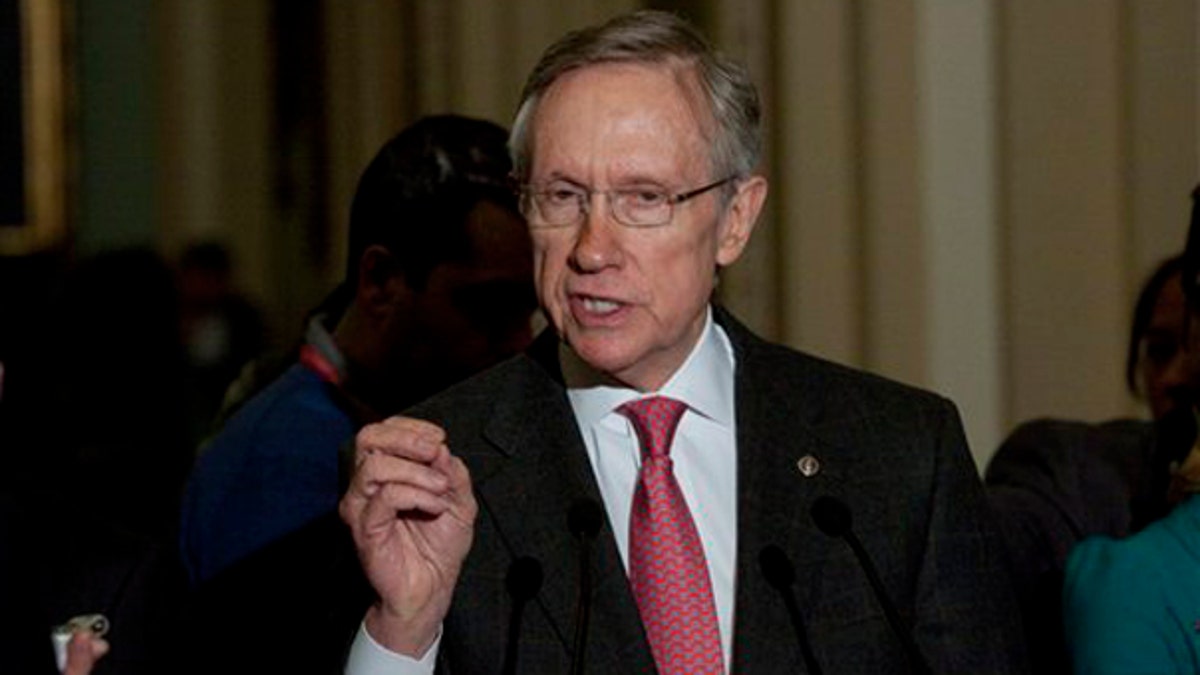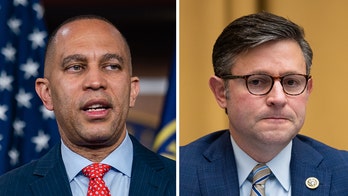
Senate Majority Leader Harry Reid of Nev., speaks to reporters after the weekly caucus luncheons on Capitol Hill in Washington, Tuesday, March 2, 2010. (AP)
Looking to challenge a time-honored privilege widely used by both parties when they are in the minority, Senate Majority Leader Harry Reid on Wednesday vowed to remove the filibuster as a weapon to kill legislation by debating it to death.
In a summit with liberal online groups, the Nevada Democrat claimed the procedural maneuver has been “abused,”
"Next Congress, we're going to take a look at it. We are likely to have to make some changes in it, because the Republicans have abused that just like the spitball was abused in baseball and the four-corner offense was abused in basketball," Reid told The Huffington Post.
Sen. Chuck Schumer, D-N.Y., appearing at the same summit, said his Rules Committee will take action in the coming weeks.
“The rules committee is going to start holding hearings on how to undo the filibuster rule,” he said.
Schumer praised a recent effort by Sen. Dick Durbin, D-Ill., to force a GOP senator to remain on the floor for hours to object to a jobs bill, calling the effort “very, very good.”
Republicans say Democrats have abused their accounting of GOP filibusters, noting for instance that any objection to Democrats not allowing GOP amendments is counted as a filibuster.
Filibusters are a key tool for the minority party to delay or stop a proposal by keeping the Senate debating an issue. The current rules of the Senate state that senators can speak and debate as long as they want unless 60 senators vote to end the stalling tactic, or “invoke cloture.”
Republican Sen. Tom Coburn, R-Okla., said that Reid’s statements don’t match his past comments on the tool.
“I can't tell you how many Democratic leaders, including our present majority leader, has said it's tyranny if you get rid of the 60-vote rule. The idea of the Senate being a place where we have to form consensus to make major changes in this country, should not be put off lightly,” he said at a press conference on Capitol Hill.
Coburn wears his mantel of “Dr. No” proudly, as he often attempts to block bills that contain earmarks or provisions that increase the deficit. Democrats criticize Coburn, in return, for sometimes supporting measures that are not paid for, like emergency war funding.
Reid said he believed the House and Senate should be different.
Indeed, in the House, there is no filibuster. The House has a Rules Committee that sets the parameters for debate, which gives enormous power to the Majority party in terms of the outcome of most legislation in that chamber.
Coburn disagreed with Reid, arguing that Democrats are asserting that they don't agree with the country's founders that the Senate should be different than the House "and that rights of the minority should always be protected.”
A handful of Democrats, led by Sen. Tom Harkin, D-Iowa, have tried for years to end the filibuster, only to be thwarted by members of their own party.
But Harkin said recently, that would not stop him. He and Sen. Jeanne Shaheen, D-N.H., introduced yet another bill that would shrink the time in which a senator can block a bill, eventually subsuming the filibuster. He first introduced the bill in 1995 while he was part of the minority party.
Under Harkin’s legislation, which Reid said would not come up for a vote this year, there would be a series of votes, gradually diminishing to a simple majority. The first vote would have a 60-vote threshold; after two days, it would take 57 votes to secure passage of a measure; then two more days with a 54-vote threshold; and one more day to get the threshold down to 51, or a simple majority.
Even with Reid’s support now, Harkin and his fellow Democrats will need to find 67 votes, the number required to change Senate rules.
And Reid recently acknowledged the futility of any effort this year, “Well, I love Tom Harkin. I’m totally familiar with his idea. It takes 67 votes, and that kind of answers the question.”




